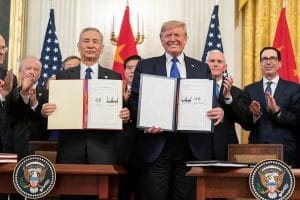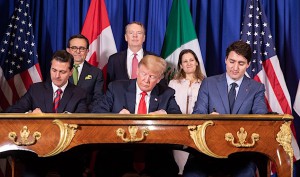With members preparing for the union’s annual political conference in Washington D.C., the United Auto Workers has come out against the Trump administration’s new “Phase 1” trade pact with China, saying the agreement favors corporations over the interests of American workers.
Unions in general and the UAW in particular have been outspoken critics of U.S. trade policy. But during his Presidential campaign in 2016 and during his administration President Donald Trump has also attacked U.S. trade policy.
Rory Gamble, the new president of scandal-scarred UAW, said in response to recent trade agreements with China and Mexico promoted by Trump have not gone far enough to help working Americans.
(Trump renews threat of 25% tariffs on European autos)
“Over the past several decades, corporate driven trade deals and tax laws with anti-labor incentives have rewarded companies that abandoned U.S. workers and communities,” Gamble said in a statement.

UAW President Rory Gamble criticized Phase 1 of the new trade deal struck between the U.S. and China.
“This has resulted in millions of good manufacturing jobs being shipped overseas to countries that trample workers’ rights, suppress workers’ wages and diminish dignity on the job. China is one of those countries – and as you would assume, over this time, our trade deficit with China has exploded.”
Between 2001 and 2018, the U.S. trade deficit in goods rose more than 500%, to over $400 billion. According to the Economic Policy Institute, trade with China during the same period eliminated 3.7 million U.S. jobs, including 2.8 million jobs in manufacturing.
“Fixing trade with China is not a partisan issue. It is a worker issue. Workers have been let down by Republican and Democratic Administrations alike,” he noted, adding it does not appear Phase 1 with China will put an end to these trade deficits and job losses.
“Phase 1 does not include democratic labor reforms or enforcement mechanisms to protect workers’ rights, lacks enforceable measures against currency manipulation, fails to limit massive subsidies to Chinese companies or end state ownership of enterprises that are central to the Chinese government’s predatory practices that kill U.S. jobs,” he said.
“Furthermore, the administration agreed to stop labeling China as a currency manipulator despite their long history in gaming the system to make their products cheaper in the U.S. and abroad,” he said.
(U.S. Senate passes NAFTA replacement, sent to Trump for signature)
Gamble, who became president of the UAW after Gary Jones resigned under a cloud of suspicion, also expressed skepticism about the newly approved U.S. Mexico, Canada Agreement. The new trade pact was approved by the U.S. House of Representatives and the U.S Senate after the Trump administration agreed to a series of changes demanded by the AFL-CIO.
“It is not a ‘fix’ for the many problems created by NAFTA and other misguided tax and labor policies that have flourished for decades in our nation’s capital and statehouses throughout the country. Hundreds of thousands of U.S. jobs that have gone to Mexico since NAFTA came into being 25 years ago will not return because of USMCA,” said Gamble as he challenged on the administration principal talking points about the new agreement.
Gamble noted that according to an analysis by the U.S. International Trade Commission, USMCA will create just 51,000 new jobs in manufacturing, mining and farming during the next six years. The International Monetary Fund predicts actual loses in the auto sector under USMCA, Gamble noted.
However, the new agreement is significantly stronger than the original negotiated by the Trump administration, according to the union, because of the work of Democrats. The UAW’s critique of USMCA also expressed the union’s continuing skepticism of two elements of the trade deal touted by advocates in Trump administration.
“Some supporters of USMCA highlight the higher auto rule of origin standards as good for U.S workers but do not note the higher standards could mostly be satisfied by shifting production from Eastern Europe and Asia to Mexico not to the United States,” Gamble said.
“They are also fond of saying it requires auto workers to have a minimum salary of $16 an hour. In fact, is an average and not a floor and companies’ intent on keeping business as usual will go through great lengths to keep wages down and jobs in Mexico,” he said.
(Federal investigators targeting UAW President Gamble)
Corporations and company unions set on keeping the status quo in Mexico will try to create and exploit any and all loopholes to make it an ineffective tool. This and future administrations will be given a great deal of discretion in determining how effective it is, Gamble added.




The UAW finally remembered Trump was a Republican.